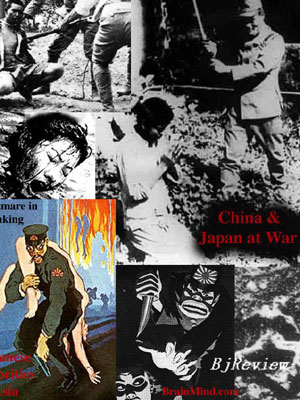
It is indeed a horrific documentary full of slaughter, rape and torture of hundreds of thousands of civilians.
And yet the documentary, Rape of Nanking, is a popular one that has been downloaded for free more than 620,000 times since it was uploaded to the Internet three months ago and viewed by over 1 million Americans, according to Dr. Rhawn Joseph, its producer.
Rape of Nanking tells a brutal story about the Japanese invasion of China's Nanjing (formerly known as Nanking) City in late 1937 during World War II.
This 77-minute documentary will be released to the general public on December 13, next year to mark the 70th anniversary of the atrocity in Nanking, or Nanjing Massacre as it is known to most Chinese, according to Joseph. As a brain research scientist and psychologist, the producer admitted that his original purpose in collecting information about the Rape of Nanking was to research the psychology of Japanese soldiers while slaughtering unarmed Chinese civilians, many being women and children. In the documentary, one can see smiling Japanese soldiers shooting at Chinese civilians and taking pleasure from watching victims suffering.
Joseph told Beijing Review that although the Second World War was still a major topic of discussion among his friends and in movies when he was a child, he actually knew very little about what the Japanese had done to the Chinese and other Asian peoples. Some 25 years ago, he recalled, he came across a single paragraph about the Nanjing Massacre describing the horrible brutality that went on for eight weeks and resulted in the death of more than 300,000 civilians in the Chinese city.
"I was surprised," he said. "I wonder why I had never heard anything about this before. I knew that the Japanese committed atrocities against Whites, but I didn't know what had happened in Nanking." Eager to understand Japanese soldiers' psychology and make more people aware of this, he then decided to write a book about the brutal historic event. For the next 20 years, he collected bits and pieces of information, made copies of pictures and obtained video footage from the National Archives.
But in 1997, Joseph read the book Rape of Nanking-a New York Times bestseller-written by Chinese-American Iris Chang, and he gave up his former idea of writing on the same topic as he thought that he "can't compete with Chang."
Then he turned to doing a movie, which he believed was not unrealistic as he had already written several screenplays and co-wrote a very successful Broadway play.
After years of preparation, Joseph started in 2005 to make the documentary Rape of Nanking with $50,000 of his own money. Since its completion in the same year, the film has so far been shown about 50 times in small theaters, mainly in the Bay area of the United States, seating between 50 and 400 people.
"It has always been standing room only, with audience members about 70 percent Asian and 30 percent White," Joseph told Beijing Review, adding, "The reaction to this film has always been shock, tears and anger."
| 